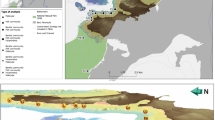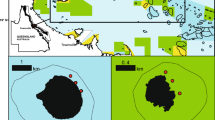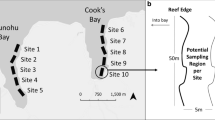Abstract
Very few coral reefs are located close enough to metropolitan cities to study the influence of large urban populations on reef communities. Here, we compare the impact of a large-scale disturbance gradient with local-scale disturbance on coral richness, cover, and composition in the Jakarta Bay and Pulau Seribu reef complex off Jakarta, Indonesia. We found no effect of local land-use type of coral reef islands on richness, composition or cover, nor did taxon richness differ among zones at the large-scale. There was, however, a pronounced difference in composition and coral cover among zones. Cover was very low and composition differed markedly in the near-shore zone 1 (Jakarta Bay) where human-induced disturbance is most intense. Cover was highest in the outlying reefs of zone 3. The highly perturbed zone 1 reefs were, furthermore, distinguished by the virtual absence of otherwise abundant coral taxa such as Acropora hyacinthus and Porites rus and the prevalence of taxa such as Oulastrea crispata and Favia maxima. Almost 60% of the spatial variation in composition was related to variation in shelf depth and island size. The importance of shelf depth was related to the prevalence of a strong environmental gradient in reef depth, pollution, and mechanical reef disturbance and salinity from Jakarta Bay to the outlying reefs. Although there was a significant univariate relationship between spatial variation in composition and distance, this did not enter into the multivariate model, except when presence–absence data was used, indicating that environmental processes are the primary structuring forces in determining local coral assemblage composition across the Pulau Seribu complex.
Similar content being viewed by others
References
Beck J., Schulze C.H., Linsenmair K.E. and Fiedler K. (2002). From forest to farmland: diversity of geometrid moths along two habitat gradients on Borneo. J. Trop. Ecol. 18: 33–51
Bellwood D.R. and Hughes T.P. (2001). Regional-scale assembly rules and biodiversity of coral reefs. Science 292: 1532–1534
Best M.B., Hoeksema B.W., Moka W., Moll H., Sutarna I.N. and Suharsono (1989). Recent scleractinian coral species collected during the SnelliusII Expedition in eastern Indonesia. Neth. J. Sea Res. 23: 107–115
Bray J.R. and Curtis J.T. (1957). An ordination of the upland forest communities of Southern Wisconsin. Ecol. Monogr. 27: 325–349
Brown B.E. and Suharsono (1990). Damage and recovery of coral reefs affected by El Niño related seawater warming in the Thousand Islands, Indonesia. Coral Reefs 8: 163–170
Brown J.H., Whitman T.G., Morgan Ernest S.K. and Gehring C.A. (2001). Complex species interactions and the dynamics of ecological systems: long-term experiments. Science 293: 643–650
Bruner A.G., Gullison R.E., Rice R.E. and da Fonseca G.A.B. (2001). Effectiveness of parks in protecting tropical biodiversity. Science 291: 125–128
Casgrain P. 2001. Permute! 3.4.9. User’s Manual at Freely available at http://www.fas.umontreal.ca/biol/casgrain/en/labo/permute/index.html.
Chapin F.S., Zavaleta E.S., Eviner V.T., Naylor R.L., Vitousek P.M., Reynolds H.L., Hooper D.U., Lavorel S., Sala O.E., Hobbie S.E., Mack M.C. and Díaz S. (2000). Consequences of changing biodiversity. Nature 405: 234–244
Chen C.A. (1999). Analysis of scleractinian distribution in Taiwan indicating a pattern congruent with sea surface temperatures and currents: examples from Acropora and Faviidae corals. Zool. Stud. 38: 119–129
Clarke K.R. and Gorley R.N. (2001). Primer v5: user manual/tutorial. Primer-E Ltd., Plymouth, UK
Coles S.L. (1996). Corals of Oman. Keech, Samdani and Coles, North Yorkshire, UK, 106
Cope M. and Morton B. (1988). The scleractinian coral community at Hoi Ha Wan, Hong Kong. Asian Mar. Biol. 5: 41–52
Cornell H.V. and Karslon R.H. (2000). Coral species richness: ecological versus biogeographical influences. Coral Reefs 19: 37–49
DeVantier L., Budiyanto A., Tuti Y., Imanto P., Ledesma R. and Suharsono (1998). Status of coral communities of Pulau Seribu (Indonesia). In: Soemodihardjo, S. (eds) Contending with Global Change 10. Proceedings: Coral Reef Evaluation Workshop, Pulau Seribu, Jakarta, Indonesia, 1995, pp 1–24. UNESCO, Jakarta
Ditlev H. (1978). Zonation of corals (Scleractinia: Coelenterata) on intertidal reef flats at Ko Phuket, Eastern Indian Ocean. Mar. Biol. 47: 29–39
Djohani R.H. (1994). Patterns of spatial distribution, diversity and cover of corals in Pulau Seribu National Park: implications for the design of core coral sanctuaries. Proc. IOC-WESTPAC 3rd Int. Sci. Symp. Bali, Indonesia, 265–279
Done T.J. (1982). Patterns in the distribution of coral communities across the Central Great Barrier Reef. Coral Reefs 1: 95–107
Dufrêne M. 1998. IndVal 2.0 programme at freely available at http://mrw.wallonie.be/dgrne/sibw/ outils/indval/home.html.
Dufrêne M. and Legendre P. (1997). Species assemblages and indicator species: the need for a flexible asymmetrical approach. Ecol. Monogr. 67: 345–366
Duivenvoorden J.F., Svenning J.C. and Wright S.J. (2002). Beta-diversity in tropical forests. Science 295: 636–637
Ellingsen K.E. (2002). Soft-sediment benthic biodiversity on the continental shelf in relation to environmental variability. Mar. Ecol. Prog. Ser. 232: 15–27
English S., Wilkinson C. and Baker U. 1994. Survey manual for tropic marine resources. ASEAN Australia marine Science Project: Living Coastal Resources. Australian Institute of marine science, pp. 1–368.
Erdmann M. 1998. Destructive fishing practice in Kepulauan Seribu Archipelago. In: Proceedings of the Coral Reef Evaluation Workshop, Kepulauan Seribu, Jakarta, 11-20 September 1995, 84–89.
Githaiga-Mwicigi J.M.W., Fairbanks D.H.K. and Midgley G. (2002). Hierarchical processes define spatial patterns of avian assemblages restricted and endemic to the arid Karoo, South Africa. J. Biogeogr. 29: 1067–1087
Harger J.R.E. (1986a). Responses of coral reef communities to environmental variables in the Kepulauan Seribu island chain. UNESCO Rep. Mar. Sci. 40: 164–173
Harger J.R.E. 1986b. Community structure as a response to natural and man-made environmental variables in the Pulau Seribu island chain. In: Soemodihardjo S. (ed.), Proceedings of MABCOMAR Regional Workshop on Coral Reefs Ecosystems: Their management practices and Research/Training needs, Bogor, 1986. UNESCO and LIPI, Jakarta, pp. 34–85.
Harger J.R.E. (1998). Sampling periodicity for tracking change in coral reefs: the case of Pulau Seribu. In: Soemodihardjo, S. (eds) Contending with Global Change 10. Proceedings: Coral Reef Evaluation Workshop, pp 25–26. Pulau Seribu, Jakarta, Indonesia
Hoeksema B.W. (1989). Taxonomy, phylogeny and biogeography of mushroom corals (Scleractinia: Fungiidae). Zool. Verh. 254: 1–295
Hoeksema B.W. 1990. Systematics and ecology of mushroom corals (Scleractinia: Fungiidae). PhD-thesis, Leiden University.
Hoeksema B.W. (1991). Control of bleaching in mushroom coral populations (Scleractinia: Fungiidae) in the Java Sea: stress tolerance and interference by life history strategy. Mar. Ecol. Prog. Ser. 74: 225–237
Hoeksema B.W. (1992). The position of northern New Guinea in the center of marine benthic diversity: a reef coral perspective. Proc. 7th Int. Coral Reef Symp. 2: 710–717
Hoeksema B.W. and Putra K.S. (2002). The reef coral fauna of Bali in the centre of marine diversity. Proc. 9th Int. Coral Reef Symp. 1: 173–178
Hughes T.P., Baird A.H., Bellwood D.R., Card M., Connolly S.R., Folke C., Grosberg R., Hoegh-Guldberg O., Jackson J.B.C., Lough J.M., Marshall P., Nyström M., Palumbi S.R., Pandolfi J.M., Rosen B. and Roughgarden J. (2003). Climate changehuman impacts, and the resilience of coral reefs. Science 301: 929–933
Hughes T.P., Baird A.H., Dinsdale E.A., Harriott V.J., Moltschaniwskyj N.A., Pratchett M.S., Tanner J.E. and Willis B.L. (2002). Detecting regional variation using meta-analysis and large-scale sampling: latitudinal patterns in recruitment. Ecology 83: 436–451
Hungspreugs M. (1988). Heavy metals and other non-oil pollutants in Southeast Asia. Ambio 17: 178–182
Karlson R.H. and Cornell H.V. (1998). Scale-dependent variation in local vs. regional effects on coral species richness. Ecol. Monogr. 68: 259–274
Karlson R.H. and Cornell H.V. (1999). Integration of local and regional perspectives on the species richness of coral assemblages. Am. Zool. 39: 104–112
Karlson R.H. and Cornell H.V. (2002). Species richness of coral assemblages: detecting regional influences at local spatial scales. Ecology 83: 452–463
Kuijper M.W.M. (2003). Marine and coastal environmental awareness building within the context of UNESCO’s activities in Asia and the Pacific. Mar. Pollut. Bull. 47: 265–272
Lam K.K.Y. 2000. Early growth of a pioneer recruited coral Oulastrea crispata (Scleractinia, Faviidae) on PFA-concrete blocks in a marine park in Hong Kong, China.
Magalhaes M.F., Batalha D.C. and Collares-Pereira M.J. (2002). Gradients in stream fish assemblages across a Mediterranean landscape: contributions of environmental factors and spatial structure. Freshwater Biol. 47: 1015–1031
Margules C.R. and Pressey R.L. (2000). Systematic conservation planning. Nature 405: 243–253
Moll H. and Suharsono (1986). Distribution, diversity and abundance of reef corals in Jakarta Bay and Kepulauan Seribu. UNESCO Rep. Mar. Sci. 40: 112–125
Moll H. 1983. Lonation and Diversity of Scleractinia on Reefs off SW Sulawesi, Indonesia. Ph.D. Thesis, University of Leiden.
Noss R.F. (1990). Indicators for monitoring biodiversity: a hierarchical approach. Conserv. Biol. 4: 355–364
Ongkosongo O.S.R. 1986. Some harmful stresses to the Seribu coral reefs, Indonesia. In: Soemodihardjo S. (ed.), Proceedings of MAB-COMAR Regional Workshop on Coral Reefs Ecosystems: Their Management Practices and Research/Training Needs, Bogor, 1986. UNESCO and LIPI, Jakarta, pp. 133–142.
Ongkosongo O.S.R. and Sukarno (1986). Background to the study sites in the Bay of Jakarta and Kepulauan Seribu. UNESCO Rep. Mar. Sci. 40: 56–79
Pandolfi J.M. (2002). Coral community dynamics at multiple scales. Coral Reefs 21: 13–23
Pandolfi J.M., Bradbury R.H., Sala E., Hughes T.P., Bjorndal K.A., Cooke R.G., McArdle D., McClenachan L., Newman M.J.H., Paredes G., Warner R.R. and Jackson J.B.C. (2003). Global trajectories of the long-term decline of coral reef ecosystems. Science 301: 955–958
Plotkin J.B. and Muller-Landau H.C. (2002). Sampling the species composition of a landscape. Ecology 83: 3344–3356
Rees J.G., Setiapermana D., Sharp V.A., Weeks J.M. and Williams T.M. (1999). Evaluation of the impacts of land-based contaminants on the benthic faunas of Jakarta Bay, Indonesia. Oceanolica Acta 22: 627–640
McGeoch M.A., Chown S.L., Rensburg B.J. and Jaarsveld A.S. (1999). Conservation of heterogeneity among dung beetles in the Maputaland Centre of Endemism, South Africa. Biol. Conserv. 88: 145–153
Sala E., Aburto-Oropeza O., Peredes G., Parra I., Barrera J.C. and Dayton P.K. (2002). A general model for designing networks of marine reserves. Science 298: 1991–1993
Scott P.J.B. (1984). The Corals of Hong Kong. Hong Kong University Press, Hong Kong, 1–112
Sheppard C.R.C. (2003). Predicted recurrences of mass coral mortality in the Indian Ocean. Nature 425: 294–297
Sørensen T. (1948). A method of establishing groups of equal amplitude in plant sociology based on similarity of species content. Det Kong Danske Vidensk Selsk Biol Skr (Copenhagen) 5: 1–34
Stoddart D.R. and Brown B.E. (1986). Umbgrove’s islands revisited. UNESCO Rep. Mar. Sci. 40: 80–98
Sukarno (1987). The effect of environmental trends and associated human damage on coral reefs in the Seribu islands, Jakarta. BIOTROP Spec. Publ. 29: 111–121
Tomascik T., Suharsono and Mah A.J. 1994. Case histories: a historical perspective of the natural and anthropogenic impacts in the Indonesian Archipelago with a focus on the Kepulauan Seribu, Java Sea. In: Ginsburg R.N. (ed.), Proceedings of the Colloquium on Global Aspects of Coral reefs: Health, Hazards and History, 1993. RSMAS, University of Miami, pp. 304–310.
Umbgrove J.H.F. (1928). De koraalriffen in de baai van Batavia. Wetensch Meded Dienst Mijnb Ned Indie 7: 1–69
Umbgrove J.H.F. (1929). The influence of the monsoons on the geomorphology of coral islands. Proc. 4th Pac. Sci. Congr. 2A: 49–54
Umbgrove J.H.F. (1939). Madreporaria from the bay of Batavia. Zool. Meded. 22: 1–64
Umbgrove J.H.F. (1947). Coral reefs in the East Indies. Bulletin of the Geological Society of America 58: 729–778
Uneputty P.A. and Evans S.M. (1997). Accumulation of beach litter on islands of the Pulau Seribu Archipelago, Indonesia. Mar. Pollut. Bull. 34: 652–655
Vail L. and Thamrongnawasawat T. (1998). Echinoderms associated woth coral reefs in Jakarta Bay and Kepulauan Seribu. In: Soemodihardjo, S. (eds) Contending with Global Change 10. Proceedings: Coral Reef Evaluation Workshop, Pulau Seribu, Jakarta, Indonesia, 1995, pp 55–65. UNESCO, Jakarta
Veron J.E.N. (1995). Corals in Space and Time. Cornell University Press, Ithaca, 1–321
Veron J.E.N. and Marsh L.M. (1988). Hermatypic corals of western Australia. Rec. West Aust. Mus. Suppl. 29: 1–136
Veron J.E.N. and Pichon M. (1976). Scleractinia of Eastern Australia, Pt 1. Aust. Inst. Mar. Sci. Monogr. Ser. 1: 1–86
Veron J.E.N. and Pichon M. (1979). Scleractinia of Eastern Australia, Pt 3. Aust. Inst. Mar. Sci. Monogr. Ser. 4: 1–459
Veron J.E.N. and Pichon M. (1982). Scleractinia of Eastern Australia, Pt 4. Aust. Inst. Mar. Sci. Monogr. Ser. 5: 1–159
Veron J.E.N., Pichon M. and Wijsman-Best M. (1977). Scleractinia of Eastern Australia, Pt 2. Aust. Inst. Mar. Sci. Monogr. Ser. 3: 1–233
Veron J.E.N. and Wallace C.C. (1984). Scleractinia of Eastern Australia, Pt 5. Aust. Inst. Mar. Sci. Monogr. Ser. 6: 1–485
Verwey J. (1931). Coral reef studies III. Geomorphological notes on coral reefs of Batavia bay. Treubia 13: 199–215
Wallace C.C. (1999). Staghorn Corals of the World. CSIRO, Collingwood, 1–421
Wallace C.C., Hoeksema B.W., Bellwood D.R., Hutchings P.A., Barber P.H., Erdmann M., Wolstenholme J. and Paulay (2002). Nature and origins of unique high diversity reef faunas in the Bay of Tomini, Central Sulawesi: the ultimate “centre of diversity”?. Proc. 9th Int. Coral Reef Symp. 1: 185–192
Warwick R.M., Clarke K.R. and Suharsono (1990). A statistical analysis of coral community responses to the 1982–83 El Niño in the Thousand Islands, Indonesia. Coral Reefs 8: 171–179
Williams T.M., Rees J.G. and Setiapermana D. (2000). Metals and trace organic compounds in sediments and waters of Jakarta Bay and the Pulau Seribu Complex, Indonesia. Mar. Pollut. Bull. 40: 277–285
Willoughby N.G. (1986). Man-made flotsam on the strand-lines of the Thousand Islands (Kepuluan Seribu) Jakarta, Java. UNESCO Rep. Mar. Sci. 40: 157–163
Yamashiro H. (2000). Variation and plasticity of skeletal color in the zebra coral Oulastrea crsipata. Zool. Sci. 17: 827–831
Zorn P., Stephenson W. and Grigoriev P. (2001). An ecosystem management program and assessment process for Ontario national parks. Conserv. Biol. 15: 353–362
Author information
Authors and Affiliations
Corresponding author
Rights and permissions
About this article
Cite this article
Cleary, D. .R., Suharsono & Hoeksema, B.W. Coral diversity across a disturbance gradient in the Pulau Seribu reef complex off Jakarta, Indonesia. Biodivers Conserv 15, 3653–3674 (2006). https://doi.org/10.1007/s10531-004-4692-y
Received:
Accepted:
Published:
Issue Date:
DOI: https://doi.org/10.1007/s10531-004-4692-y




